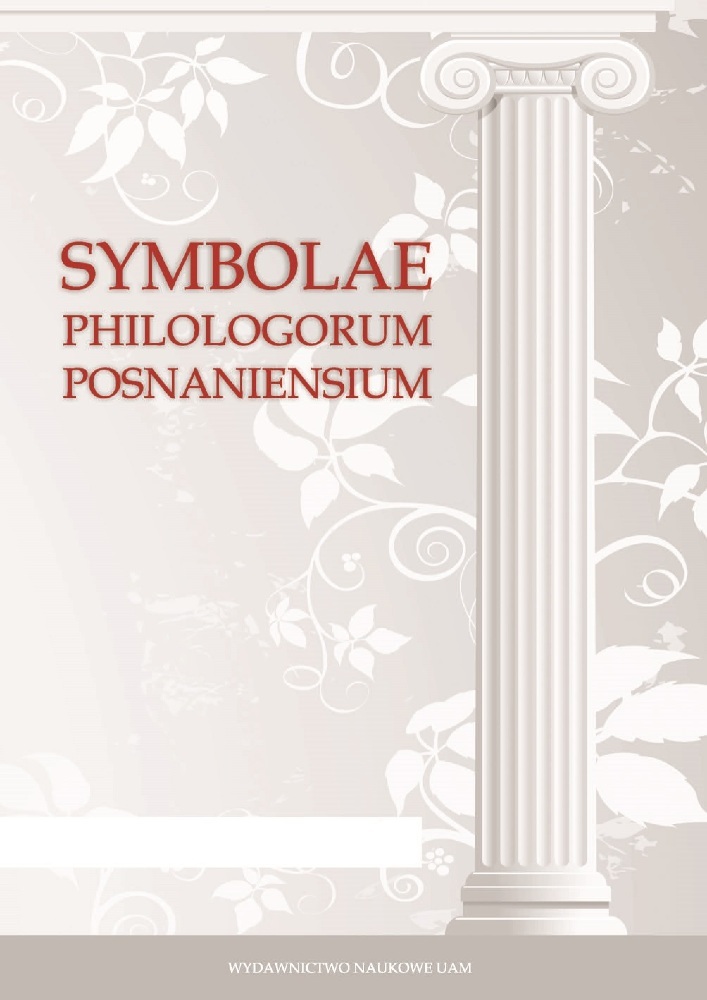Abstrakt
Literary texts may enable a much later reader to observe how collective memory interrelates with personal
remembrance. This goes without saying for Jane Austen or George Eliot. What is new, however, is that passages
from epinician poetry by Simonides, Pindar, and Bacchylides may inform on the same process, i.e. the
invention of a society’s collective remembrance, or social memory. The argument is inspired by Maurice
Halbwachs, according to whom a society’s cultural complexity is revealed by literature. Halbwachs read
Balzac and Dickens, he often cited Stendhal and even Proust, but the practice of which he speaks obtained also
in those groups in antiquity where Sappho and Alcaeus performed.
Bibliografia
Barrett 1978: W.S. Barrett, The Oligaithidai and their victories, in: Dionysiaca, Cambridge 1978, 1–20.
Boedeker/Sider 2001: D. Boedeker, D. Sider (edd.), The New Simonides, Contexts of Praise and Desire, Oxford 2001.
Burnett 1983: A.P. Burnett, Three Archaic Poets: Archilochus, Alcaeus, Sappho, London 1983.
Carey 2007: C. Carey, Pindar, Place, and Performance, in: S. Hornblower, C. Morgan (edd.),
Pindar’s Poetry, Patrons, and Festivals, Oxford 2007, 199–210.
Currie 2005: B. Currie, Pindar and the Cult of Heroes, Oxford 2005.
Gianotti 1975: G.F. Gianotti, Per una poetica pindarica, Torino 1975.
Halbwachs 1925: M. Halbwachs, Les cadres sociaux de la mémoire, Paris 1925, cited according to the new ed. Paris 1952.
Halbwachs 1950: M. Halbwachs, La mémoire collective, Paris 1950.
Herington 1985: J. Herington, Poetry into Drama: Early Tragedy and the Greek Poetic Tradition, Berkeley 1985.
Hulsenboom 2013: P. Hulsenboom, ‘Now I have forgotten all my verses’: Social Memory in the Eclogues of Virgil and Calpurnius Siculus, “Language and Literary Studies of Warsaw” 3
(2013), 13–28.
Kirkwood 1982: G. Kirkwood, Selections from Pindar, Chico/Ca. 1982.
Lefkowitz 1991: M.R. Lefkowitz, First-person fictions: Pindar’s poetic ‘I’, Oxford 1991.
Lefkowitz 2012: M.R. Lefkowitz, The Lives of the Greek Poets, London 22012.
Lobel 1959: E. Lobel, The Oxyrhynchus Papyri XXV, London 1959.
Lobel 1967: E. Lobel, The Oxyrhynchus Papyri XXXII, London 1967.
Maehler 2004: H. Maehler, Bacchylides: a selection, Cambridge 2004.
Minchin 2012: E. Minchin, Memory and Memories: Personal, Social, and Cultural Memory in the Poems of Homer, in: Homeric Contexts, Berlin 2012, 83–99.
Montigny 2005: G. Montigny, Maurice Halbwachs: vie, oeuvre, concepts, Paris 2005.
Morrison 2007: A.D. Morrison, Performances and Audiences in Pindar’s Sicilian Victory Odes, London 2007.
Namer 1997: G. Namer (ed.), M. Halbwachs, La mémoire collective, Paris 1997.
Namer 2000: G. Namer, Halbwachs et la mémoire sociale, Paris/Montréal 2000.
Rösler 1990: W. Rösler, Mnemosyne in the Symposium, in: O. Murray (ed.), Sympotica: a symposium on the symposium, Oxford 1990, 230–7.
Stehle 1997: E. Stehle, Performance and Gender in Ancient Greece: Nondramatic Poetry in its Setting, Princeton 1997.
Warnock 1987: M. Warnock, Memory, London 1987.
Willcock 1995: M.M. Willcock, Pindar, Victory odes, Cambridge 1995.
Licencja
